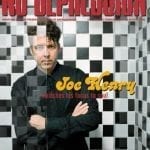Hello Stranger from Issue #61
Although optimism is hardly my forte, we planted an orchard this fall. Not where our pond was, up the hill — that dirt will take some work and time before it’ll grow much but dead leaves — but out back at my father-in-law’s place, where long ago he ran a few inherited cattle until he thought better of that. After, when I first came around, he worked a medium-sized garden plot, until he wearied of warring with woodchucks and deer and mice and rabbits and every other hungry thing.
But it bothered him just to throw things he didn’t need in the barn and waste that beautiful space.
Everything I know about trees and fruit bushes I learned in a book. One book, and I didn’t learn it, I just read it and hoped somebody else in the family knew more than me. (They do.) This is what I mean by optimism. It will take some years for these small bundles of sticks to turn into trees, to bear fruit, and at least that long for us to figure out what to do with all that fruit. If we can dissuade the squirrels and the birds from eating more than their share.
If nothing else we’ll put a bench out by his pond and watch the feast, I suppose.
We came to the idea separately, but at the same time. I had been reading James Howard Kunstler’s half-right apocalyptic scree The Long Emergency, which argues that we’re going to run out of oil sooner than advertised, and that by the time my daughter is ready for college civilization we will have retreated to the near Middle Ages.
Not really how I’d planned to spend my retirement, but, then, I’ve never planned to retire.
Anyway, as the paranoia ebbed to tolerable levels, I began to think maybe a small orchard would be a good idea in case Kunstler was more than half-right. Dan, quite independently, thought it would be a good family project, if we were willing, and an excuse to keep his tractor running.
This is a commitment I do not take lightly. There are 40-odd trees and berry bushes out there, and we mean to plant more. The soil’s not perfect, but the view is. The work’s new and interesting, and then it’ll get old and hard and repetitive, and there’s solace in that, too.
After supper on Thanksgiving I took a walk out back, even knowing that everything we planted is dormant. Though I adore certain kinds of noise, I also require a fair bit of silence each day. Sure enough, nothing had changed. For any number of years, and some Thanksgivings, there was a spot by the north fork of the Skykomish River that I used to visit, a spot where I used to stand on a good day and applaud.
I don’t live there anymore, and it’s been a long time gone. We decided to come here, to Susan’s hometown in eastern Kentucky, two years ago Thanksgiving, in fact. But out there in the field, looking at the clear gray sky and the surrounding trees bearing up colorfully under the hard edge of fall, I clapped a little. This really is home, and I’m lucky to be here.
Too many of my friends are not at home where they live, cannot afford to live where their home might be. Since Thanksgiving I’ve had a half-dozen conversation with people trying to figure out how to pick up stakes and go somewhere else — the endless American quest for freedom — where things would be better, or easier, or at least less expensive.
One of the many reminders Hurricane Katrina offered was how important inexpensive rent (or home-buying) is to the development of art. You cannot take chances, you are not free to think — much less simply to be — if there’s constant pressure to make a mortgage, or if the only livable rental units eat so much of your paycheck that it’s hard to pay for an oil change, much less a car that would reliably take you to the next state. Or dinner.
We are a rootless people rooted to music. We are a community who value art. And we are being priced out of the marketplace. Maybe Kunstler’s half-right, maybe I stumbled on the answer for more private reasons; maybe the future is in small towns, with all of us on the mojo wire trying to make things happen. I don’t know, but I’ll keep thinking about it.
Meanwhile, because New Orleans really is a crucial fount of American music, we’ve added a one-page news essay in the front of the magazine this issue, Alex Rawls’ “Letter From New Orleans”. What happens there in the resettlement and rebuilding is crucial to American music, and is a kind of litmus test for the future of our society. We’ll run that column until there’s no story to tell.
Hoping, always, that New Orleans will bear fresh fruit and nurture us all.




